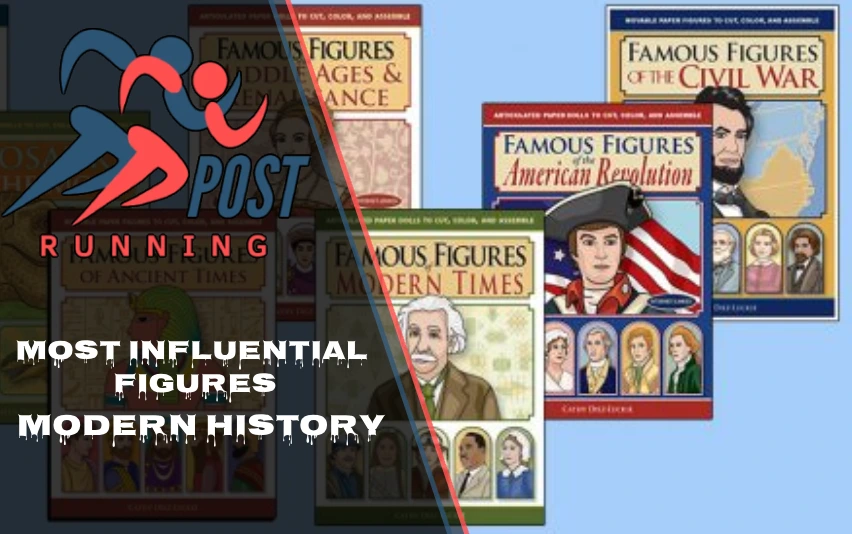Throughout the ages, certain individuals have left an indelible mark on the course of human history. These most influential figures in modern history have shaped our world in profound ways, leaving legacies that continue to impact us today. From groundbreaking scientists to visionary leaders, these remarkable people have changed the way we think, live, and interact with one another.
Who are the Most Influential Figures in Modern History?
The most influential figures in modern history are those whose actions, ideas, and leadership have significantly altered the world we live in. These extraordinary individuals come from diverse backgrounds and fields, including politics, science, technology, and social activism. Their contributions have not only shaped their own times but continue to resonate in our present day.
These figures aren’t just names in history books; they’re the architects of our modern world. They’ve challenged existing norms, pushed the boundaries of human knowledge, and fought for justice and equality. Their influence extends far beyond their lifetimes, inspiring generations and shaping the course of human progress.
Top Influential Figures
Let’s take a closer look at some of the most influential figures who have left an indelible mark on modern history:
Muhammad (c. 570-632)
As the founder of Islam, Muhammad’s influence on world history is immeasurable. His teachings and leadership laid the foundation for one of the world’s major religions, shaping the spiritual and political landscape of vast regions. Today, Islam has over 1.8 billion followers worldwide, making it the second-largest religion after Christianity.
Muhammad’s life and teachings continue to guide millions of people in their daily lives, influencing everything from personal behavior to global politics. His emphasis on social justice, charity, and unity among believers has had a lasting impact on societies across the globe.
Isaac Newton (1643-1727)
Newton’s contributions to science and mathematics revolutionized our understanding of the physical world. His laws of motion and universal gravitation laid the groundwork for classical mechanics, while his work in optics and mathematics pushed these fields into new territories.
Newton’s ideas weren’t just abstract concepts; they had practical applications that transformed technology and engineering. From predicting the movements of celestial bodies to understanding the behavior of light, Newton’s work continues to be fundamental to modern science and technology.
Albert Einstein (1879-1955)
Einstein’s theory of relativity fundamentally changed our understanding of space, time, and the universe itself. His famous equation E=mc² not only revolutionized physics but also paved the way for nuclear energy and weapons, profoundly impacting the 20th century and beyond.
Einstein’s work went beyond pure science; he was also a vocal advocate for peace and civil rights. His status as a scientific genius gave weight to his political and social views, making him an influential figure in broader societal discussions.
Martin Luther King Jr. (1929-1968)
King’s leadership in the American civil rights movement brought about significant social and political change. His advocacy for racial equality through nonviolent resistance inspired millions and led to landmark civil rights legislation in the United States.
King’s influence extends far beyond America’s borders. His methods of peaceful protest and his powerful oratory have inspired social justice movements around the world. His famous “I Have a Dream” speech continues to be a rallying cry for equality and human rights globally.
Marie Curie (1867-1934)
As a pioneering scientist in radioactivity research, Marie Curie broke new ground not just in science but also for women in academia. She was the first person to win Nobel Prizes in two different fields (Physics and Chemistry), paving the way for future generations of women in science.
Curie’s work on radioactivity led to significant advances in medical treatments, particularly in the field of radiology. Her dedication to science, even at great personal risk, has made her an enduring symbol of scientific inquiry and perseverance.
Early Life and Background
The early lives of these influential figures often provide fascinating insights into the development of their world-changing ideas and actions. Let’s look at a few examples:
Abraham Lincoln (1809-1865) grew up in a humble family on the American frontier. His early experiences of poverty and hard work shaped his character and his views on social equality. Despite limited formal education, Lincoln’s love for learning and his determination led him to become a lawyer and eventually the 16th President of the United States.
Marie Antoinette (1755-1793) was born into Austrian royalty before becoming Queen of France. Her privileged upbringing in the Habsburg court contrasted sharply with the realities of pre-revolutionary France, contributing to the tensions that would ultimately lead to the French Revolution.
Florence Nightingale (1820-1910) came from a wealthy British family but chose to pursue nursing, a profession considered unsuitable for women of her class at the time. Her decision to follow her calling despite social expectations led her to revolutionize nursing practices and hospital sanitation, saving countless lives.
These diverse backgrounds highlight how influential figures often emerge from unexpected places, challenging societal norms and expectations along the way.
Timeline of Career and Achievements
To better understand the impact of these influential figures, let’s look at a timeline of some key events:
| Year | Event |
|---|---|
| 1775 | George Washington becomes commander of the Continental Army |
| 1863 | Abraham Lincoln issues the Emancipation Proclamation |
| 1903 | Marie Curie wins her first Nobel Prize in Physics |
| 1955 | Rosa Parks refuses to give up her bus seat, sparking the Montgomery Bus Boycott |
| 1969 | Neil Armstrong becomes the first person to walk on the moon |
Each of these events represents a significant moment in history, often the culmination of years of work and struggle. For instance, Lincoln’s Emancipation Proclamation was a crucial turning point in the American Civil War and the fight against slavery. Similarly, Rosa Parks’ act of defiance was a catalyst for the broader civil rights movement in the United States.
These moments didn’t happen in isolation. They were part of larger historical processes and movements, often building on the work of countless others. Yet, they stand out as pivotal points where individual actions intersected with broader societal changes, creating ripple effects that continue to this day.
Characteristics of Influential Leaders
While the most influential figures in modern history come from diverse backgrounds and fields, they often share certain characteristics that contributed to their impact:
- Visionary thinking: These leaders could see beyond the present, imagining new possibilities and working towards them. Einstein’s ability to conceive of revolutionary scientific theories or King’s dream of racial equality exemplify this trait.
- Strong communication skills: The ability to articulate ideas clearly and persuasively is crucial for influencing others. King’s powerful speeches or Newton’s clear scientific writings demonstrate this skill.
- Resilience in the face of adversity: Many influential figures faced significant challenges and setbacks but persevered. Curie’s determination to pursue science despite gender barriers is a prime example.
- Ability to inspire and mobilize others: True influence often comes from the ability to motivate others towards a common goal. Muhammad’s leadership in spreading Islam or Washington’s role in the American Revolution showcase this quality.
- Innovative problem-solving skills: Many influential figures found new ways to address existing problems. Nightingale’s approach to hospital sanitation or Einstein’s novel theories in physics illustrate this trait.
These characteristics aren’t just historical curiosities; they’re qualities that continue to be valuable in leaders today. By understanding what made these figures so influential, we can better recognize and nurture leadership potential in our own time.
Conclusion
The most influential figures in modern history have shaped our world in countless ways. From revolutionizing scientific understanding to fighting for social justice, these individuals have left an indelible mark on human society. Their actions and ideas continue to resonate today, influencing how we think, live, and interact with one another.
What’s particularly striking about these figures is the diversity of their backgrounds and fields. They remind us that influence and impact can come from anywhere – from the halls of power to humble beginnings, from scientific laboratories to the streets of protest movements.
As we look to the future, the lessons and examples of these influential figures remain relevant. They inspire us to think big, to challenge the status quo, and to work towards positive change in our own spheres of influence. In studying their lives and achievements, we not only gain a better understanding of our past but also find inspiration for shaping our future.
The story of human progress is an ongoing one, and while we’ve focused on some of the most influential figures in modern history, it’s important to remember that this story is continually being written. Today’s actions and ideas may well be shaping the influential figures of tomorrow. By learning from the past, we can better prepare ourselves to face the challenges and opportunities of the future, potentially becoming influential figures in our own right.
Discover more fascinating insights—explore Running Posts Today.















